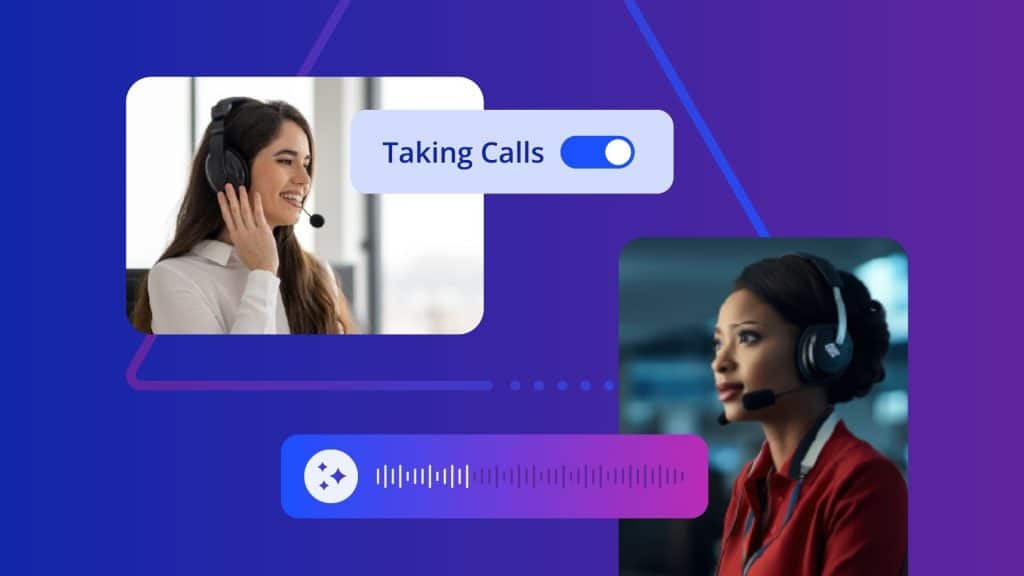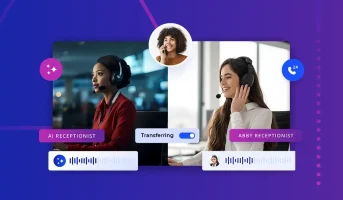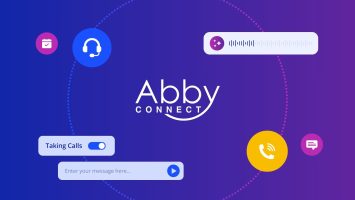Small businesses today can choose from two main types of call answering services: human virtual receptionist and AI receptionist. Each offers a unique balance between personal connection and automation, helping businesses handle customer conversations efficiently while staying cost-effective. At Abby Connect, we bring both worlds together. Our hybrid approach combines human warmth with AI precision – so whether you’re running a law firm, dental practice or accounting firm, you’ll never miss another lead or client message again.
Call answering services are designed to take the pressure off small teams by handling incoming messages from websites, social media, and even mobile apps. Some rely on trained live agents to respond in real time, while others use AI technology to provide 24/7 support. The right option depends on your customer volume, industry, and budget, but all can make your business appear more responsive, professional, and connected.
Here’s a quick summary of this article:
- Call answering services help small businesses stay available, organized, and professional by managing calls across all channels.
- There are two main types of services: human virtual receptionists and AI receptionists, each offering a different balance of personalization and automation.
- Both options integrate with CRMs, scheduling tools to book appointments, and other business systems to keep customer data consistent and easy to access.
- Choosing the right setup depends on your call volume, operating hours, budget, and industry requirements.
- Abby Connect offers flexible plans that scale as you grow, with live US-based receptionists and secure, compliant technology built for small business needs.
What Are Call Answering Services?
A call answering service is a solution that manages customer conversations across multiple channels, such as your website, social media, and messaging apps. These services help businesses respond to customers quickly, answer common questions, and keep communication flowing even outside regular working hours.
“Working with Abby Connect has been extremely positive. They’re able to pick up the patient’s information and send it to us through email. So without Abby Connect, we would be losing these people to other dental offices. And now, we’re able to retain them.” – Mark D., Dentist & Practice Owner
Instead of relying on a small in-house team to handle every inquiry, a call answering service takes on the responsibility of responding promptly and professionally. This can be done through live agents, automated AI receptionists, or a combination of both.
For small businesses, the main advantage lies in accessibility. Customers can reach you anytime, without waiting on hold or sending unanswered emails. Whether it is confirming an appointment, requesting a quote, or resolving a simple query, a call answering service ensures every message gets the attention it deserves.
How Do Call Answering Services Work?
Call answering services connect directly to your business’s communication channels, allowing trained agents or AI systems to manage customer conversations on your behalf. Once set up, they handle incoming messages and ensure each query reaches the right person or receives an instant response.
Here’s how they typically work:
- Integration: The service is connected to your phone system by simple forwarding.
- Customer Inquiry Received: A visitor calls your business.
- Initial Response: An AI receptionist or virtual receptionist instantly answers and replies, confirming receipt and providing a basic answer or menu of options.
- Follow-Up and Logging: Every interaction is recorded in a dashboard, your CRM, or customer portal for future reference, ensuring nothing slips through the cracks.
By combining automation with human support, call answering services ensure your business stays responsive 24/7 while maintaining a consistent, professional tone with every customer.
Types of Call Answering Services
Small businesses today can choose from several types of call answering services, each designed to meet different customer service needs.
The two most common are virtual receptionist services and AI receptionists.
Some businesses use only one, while others combine the two for full coverage across working hours and time zones.
Human Virtual Receptionist Services
A human virtual receptionist combines the personal touch of a live receptionist with the flexibility of remote work. Instead of hiring someone in-house, businesses can use trained professionals who handle calls from an external service.
What virtual receptionists can do:
- Answer questions and route messages to the right person
- Schedule appointments and manage calendars
- Capture new leads and update CRM systems
- Provide consistent customer service across time zones
Virtual receptionists are particularly valuable for small teams that need to maintain a polished, professional image without the expense of full-time staff. Learn more about Abby’s Human Receptionist services.
AI Receptionist
An AI receptionist uses the newest AI technology to handle common questions, collect customer information, book appointments, and provide instant replies. It is available 24/7 and can manage a large volume of inquiries simultaneously.
Advantages of an AI receptionist:
- Always available: They operate around the clock, even when your team is offline.
- Consistent communication: Every customer receives a clear and accurate response.
- Efficiency: Routine questions are automated, freeing up your human team for more complex issues.
Modern AI receptionist services can integrate with business tools like CRMs and online booking systems. This makes them a powerful tool for small businesses that want to appear responsive and professional without needing a large support team. Learn more about Abby’s AI receptionist services.
How to Choose the Right Call Answering Service for Your Business
Finding the right call answering setup depends on how your business operates, the type of support your customers expect, and the image you want to project.
Each service offers distinct advantages.
The goal is to choose the right combination that keeps your business responsive, professional, and cost-efficient.
Here are the main factors to consider before deciding:
- Customer Inquiry Volume: Consider how many calls you receive daily. If you manage a high number of simple, repetitive questions, an AI receptionist can handle these instantly. For more complex or sensitive conversations, a human virtual receptionist or hybrid approach can provide the reassurance and empathy customers value.
- Availability and Operating Hours: Do your customers reach out after hours or across time zones? If so, pairing an AI receptionist for overnight coverage with a live or human receptionist during business hours ensures you never miss an opportunity.
- Budget and Scalability: A human virtual receptionist service is often more affordable than hiring full-time staff, while an AI receptionist delivers long-term savings through automation and can accommodate a higher call volume. Start with the level of support you need now, but choose a provider that can scale as your business grows.
- Integration with Your Systems: The best services integrate seamlessly with your CRM, booking software, or call management tools. This ensures customer data stays consistent and that your team can pick up any conversation without losing context.
- Industry and Compliance Requirements: Businesses handling sensitive data, such as legal or healthcare providers, must ensure their call answering partners follow strict security and privacy standards like GDPR or HIPAA. Always confirm that the provider meets these obligations.
Choosing the right mix allows your business to stay accessible, organized, and professional at every touchpoint. When customers know they can reach you easily and receive thoughtful, timely support, it strengthens loyalty and sets your brand apart.
Conclusion: You Should Build a Smarter, Always-On Customer Experience
Call answering services are one of the simplest ways to make your business feel more responsive, organized, and professional. Whether you use an AI receptionist or a human virtual receptionist, each option helps ensure that every customer inquiry gets the attention it deserves.
By combining automation with a personal touch, you can stay available around the clock without overloading your team. An AI receptionist manages routine queries while a human virtual receptionist adds the additional layers of empathy and professionalism to each interaction.
You should focus on creating a setup that saves time, strengthens relationships, and reflects your brand’s personality. When customers can always reach you and always feel heard, your business naturally stands out for the right reasons.




